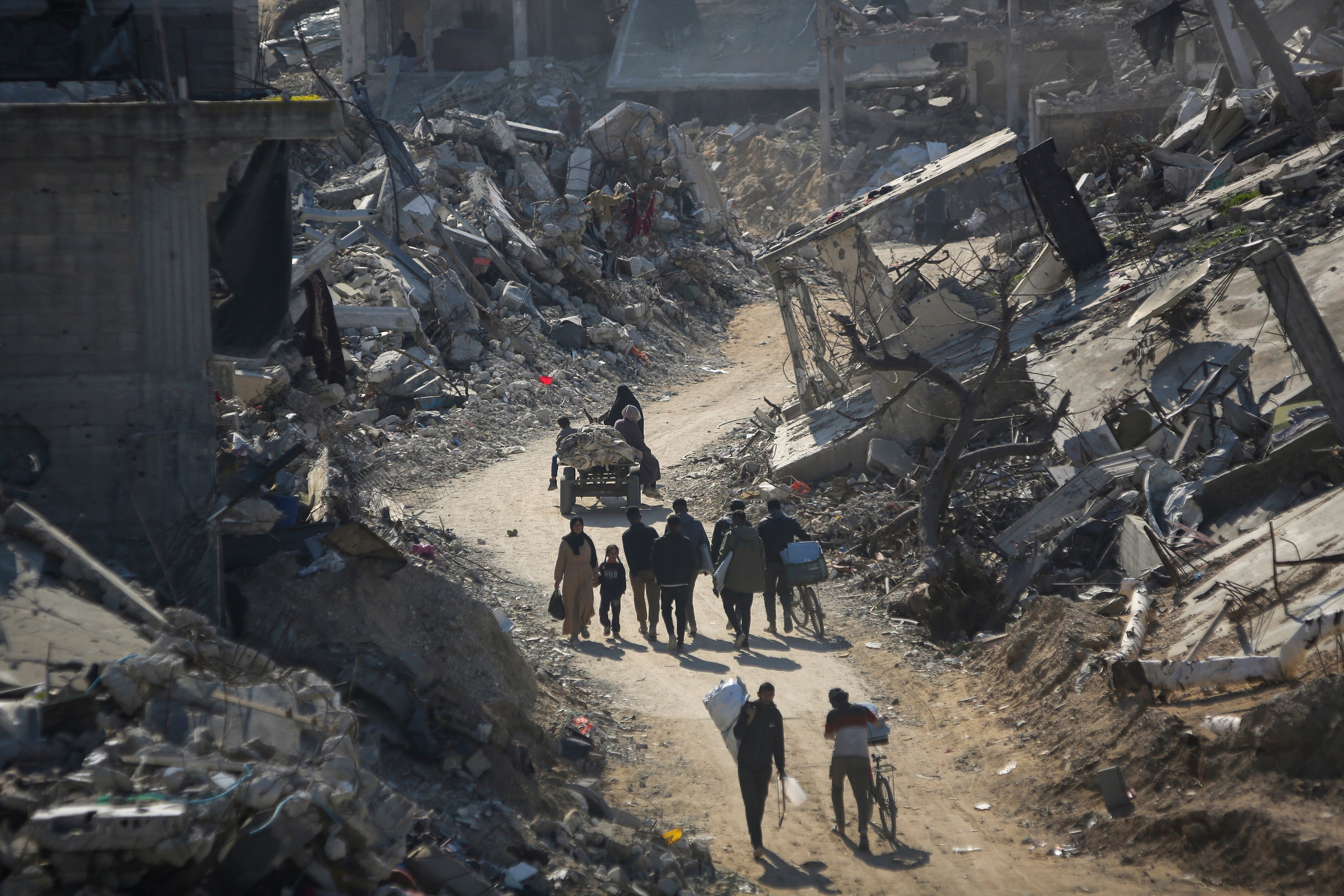
Hamas is set to release three Israelis held captive in Gaza, including a woman, a female soldier and an 80-year-old man, as part of a ceasefire deal with Israel, a group representing the families of the hostages has said.
The Hostages Families Forum said on Wednesday they “welcomed the news” of the expected releases, adding that “we will not give up or stop at any stage until all hostages return home – down to the very last one”.
They named the three Israelis as Arbel Yehoud, 29, who was seized from her home in Kibbutz Nir Oz; Gadi Moses, 80, one of the oldest remaining hostages, who was also taken from Nir Oz; and Israeli soldier Agam Berger, 20, who was seized by militants from Nahal Oz base on 7 October.
The group added that five Thai citizens were also among those due to be released, without giving names.
David Mercer, the Israeli government spokesperson, also confirmed three Israelis would be released. He said in a Wednesday briefing that a further three people will be released from Hamas captivity on Saturday.
The Hostages Families Forum said, “An entire nation has fought for them and anxiously awaits their longed-for return to their families’ embrace.”
The release is part of a long-fought-for ceasefire between Israel and the Palestinian militant group Hamas, which has paused the war in Gaza in exchange for the freedom of dozens of hostages held in Palestinian territory, as well as hundreds of Palestinian prisoners held by Israel. News of the next round of releases comes as the United Nations reported that more than 370,000 displaced people in Gaza have streamed into the devastated north of the strip, returning to the remains of their homes for the first time since the start of the ruinous war 15 months ago.
Israel launched its devastating offensive in Gaza in the wake of Hamas’s bloody 7 October attacks on southern Israel, where the group seized 250 people and killed more than 1,200. Israel says around 90 hostages remain in captivity in Gaza, 35 of whom are presumed dead.
Palestinian health officials say Israel’s ferocious bombardment of the strip has killed more than 47,000 people, mostly women and children. The United Nations says that 90 per cent of the strip’s two million-strong population has been displaced, and the destruction is so widespread that it could take 21 years to rebuild.
Civilians returning to the north of Gaza, by far the most destroyed area, told The Independent that they were determined to rebuild, but the scale of destruction is unfathomable.

Israel began on Monday pulling out of the Netzarim corridor – which cuts Gaza in half – allowing the return of Palestinians as part of the first phase of the ceasefire.
On Wednesday Israel’s Channel 13 reported that US president Donald Trump’s special envoy to the Middle East Steve Witkoff visited Gaza and the corridor as part of a trip to the region, to oversee the implementation of the ceasefire there. Trump has said he wants to leverage the ceasefire into a broader regional accord that would include Saudi Arabia and Israel formalising diplomatic ties. Mr Witkoff travelled to Saudi Arabia the day before entering Israel. Mr Mercer declined to provide any details on Mr Witkoff's visit to Gaza.
Since the ceasefire has been in place, humanitarian aid has been able to flow into Gaza at levels not seen during the war. But there are concerns that the “unprecedented needs” will not be met. Particularly after a new law was adopted in October, that bans the operations of the largest UN agency operating in Gaza, UNRWA, on Israeli land – including East Jerusalem, which Israel annexed in a move not recognised internationally.
Israeli government spokesperson Mr Mercer confirmed that the ban on UNRWA in Israel will be implemented on Thursday with “no offices, no contact, no operations” accusing the agency of being a “threat to Israel’s national security” a claim UNRWA vehemently denies.
Officials within the UN agency told The Independent that this would mean vacating 12 premises in occupied East Jerusalem, including closing down schools serving 1,100 children and health centres that provide primary healthcare to 70,000 to 80,000 people.
“No other member state around the world has closed down a United Nations agency. It has never happened in the history of the UN,” UNRWA communications director Juliette Touma told The Independent.
The head of UNRWA, Philippe Lazzarini, told the 15-member Security Council on Tuesday that the move would see their humanitarian operations “crippled”.
UN Secretary-General Antonio Guterres and the Security Council have described UNRWA as the backbone of the humanitarian aid response in Gaza. Israel has repeatedly denied this.







